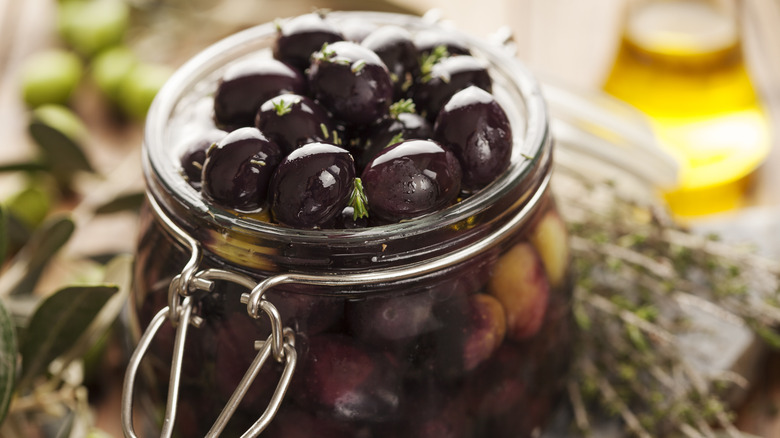Why You Should Always Buy Refrigerated Kalamata Olives
Plump Kalamata olives abound in the canned aisle of the grocery store. These delectable, purplish almond-shaped delights can be eaten as a snack, used for garnish in a cocktail, or incorporated into a recipe. Kalamata olives undergo a curing and brining process, giving them their distinctly salty, rich, and fruity taste. This curing and brining are also instrumental in preparing the olives for long-term storage. In America, it's quite popular for Kalamata olives to be stored in a red wine vinegar-based brine, giving them a particularly tart wine taste.
But did you know that conveniently jarred Kalamata olives are often the inferior choice? Since they are made to be shelf stable, jarred Kalamata olives can be mushier than their more fresh, refrigerated counterparts. The olives themselves are the same, but this distinct textural difference has more to do with the liquid they're stored in. Refrigerated olives are often prepared with a flavorful marinade in addition to the brine and are more apt to retain that meaty texture that olive lovers crave.
What to know about Kalamata olives
Kalamata olives are harvested at their peak ripeness, delicately picked, and cured in a salty brine. This brine not only makes the olives non-toxic, but it removes their inherent bitterness and flavors them as well, depending on any spices or oils added to the brine. Then, the olives are combined with the brine and jarred and sealed for storage and shipping.
The brine is an instrumental component of the olive-making process, but consider how long the olives are sitting in the brine as they make their way to your grocery store and eventually, your pantry. The brine keeps the olives stable but can turn their flesh from shiny and meaty to soft and dull. So while they may last longer at room temperature, their quality doesn't hold up so well. If you're ready to enjoy your Kalamata olives soon after purchasing, go for refrigerated ones for the freshest experience. Refrigerated Kalamata olives can still last you about 12 to 18 months. And if you're fortunate to get your hand on freshly-picked olives, Kalamatas are one of the best varieties to use for home canning as they can be cured using water alone.
How to properly store your Kalamata olives, refrigerated or not
Since they're brined and sealed, you may not think jarred olives have any chance of going bad, a similar mistake you could make regarding pickles. But while an unopened jar of olives can remain fresh for about two years, it's important to look out for signs of spoilage. The appearance of mold is an obvious sign of spoilage, but look out for icky changes in the smell of the olive brine or if the skins start to get particularly wrinkly.
It may seem quite obvious, but for your store-bought refrigerated olives, you'll have to keep them refrigerated at home. You'll also likely regret draining your olives, as that precious brine is the key to making sure they last longer. Jarred, shelf-stable olives will suffer without their brine as well. Overall, for the meatiest, most flavorful Kalamata olives, think in the short term and reach for refrigerated kind.


